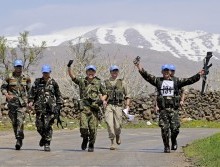
Will peace return to the Israel-Syria border region?
Golan Heights UN Peacekeepers. Illustrative. Photo Courtesy of UN Photo/Wolfgang Grebien.
The Syrian civil war rages on and Israel continues to be concerned by Iran’s presence in their northern neighbor, but nonetheless this week a small step towards normal will be achieved when the Quneitra Crossing between Israel and Syria in the Golan Heights will be re-opened. While this doesn’t signal any type of normalization of relations between Israel and Syria—rather it is a reminder of their unresolved war—it at least enhances the United Nations peacekeeping between the sides.
A press release last week from the United States Mission to the UN notes that re-opening the border crossing “is part of an ongoing effort” by UN peacekeepers in the UN Disengagement Observer Force (UNDOF), whose mandate includes maintaining the Israel-Syria ceasefire.
US Ambassador to the UN Nikki Haley applauded the move, but noted that keeping the border peaceful is a broader effort than just enabling the peacekeepers to do their work. In her comments, which were included in the US Mission press release, she pointed to the importance of upholding 1974 ceasefire agreement that establishes a de-militarized zone between the sides. Israel has highlighted this requirement in the past as well in complaining about Syrian actions around the border, so the Quenitra Crossing re-opening would appear to signal quieter times—at least near the border.
“The United States welcomes the re-opening of this crossing, which will allow UN peacekeepers to step up their efforts to prevent hostilities in the Golan Heights region,” said Haley. “…While this is an important step, all sides must abide by the 1974 Agreement and keep any military forces other than UN peacekeepers out of the area.”
Syrian forces reportedly battled rebels in the south of the country, which among other things increased the risk of stray fire to land in Israel. The Israelis repeatedly expressed concern over Syrian actions in the border region, citing the 1974 agreement.
Following the invasion of Israeli air space by a Syrian jet that Israel shot down back in July, Israeli Prime Minister Benjamin Netanyahu called the Syrian incursion a “a gross violation of the 1974 Separation of Forces Agreement with Syria.” In a press release from his office at the time, Netanyahu said, “I have reiterated and made clear that we will not accept any such violation. We will not accept any such penetration of, or spillover into, our territory, neither on the ground nor in the air.”
Earlier in the summer, per another Israeli press release at the time, Netanyahu made clear to the Russians that “Israel insists that [1974] Separation of Forces Agreement between it and Syria be honored as it was in the decades before the outbreak of civil war in Syria, and that Israel will continue to act against any attempt by Iran and its proxies to establish a military presence in Syria.”
While the Israel-Syria tensions continue, the fact that the situation is calm enough to enhance the peacekeeping efforts at the border is a welcome improvement over the summer.
Haley, in her comments last week, said that both sides are responsible for enabling the UN peacekeepers to do their jobs, but she singled out the Syrians as particularly needing to stay out of the peacekeepers’ way.
“We look to both Israel and Syria to provide UN peacekeepers the access they need as well as assurances of their safety,” said Haley. “We also call on Syria to take the necessary steps so UNDOF can safely and effectively deploy and patrol without interference.”
(By Joshua Spurlock, www.themideastupdate.com, October 14, 2018)
